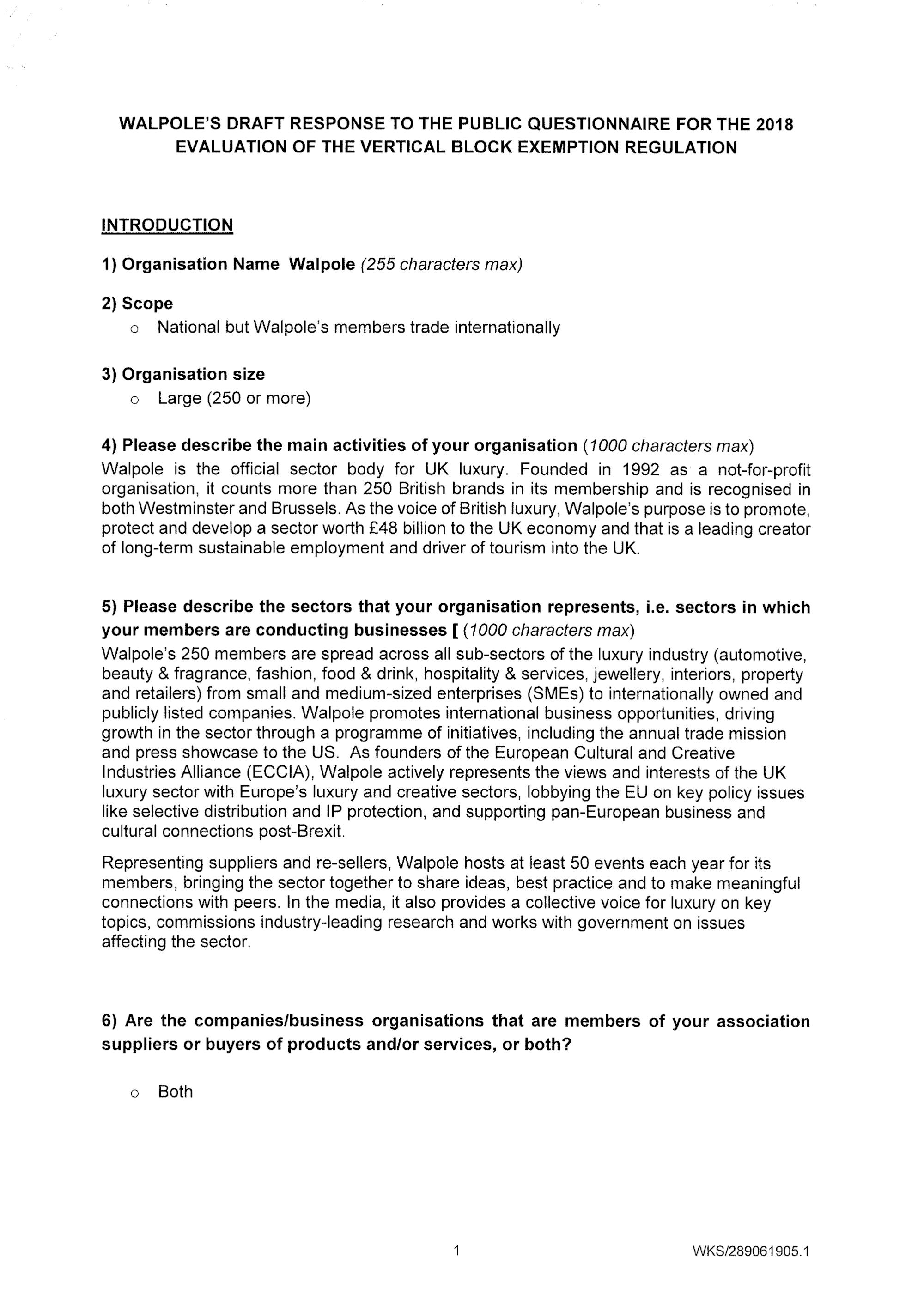

for Walpole members and
non-members available now
at The Londoner



In the context of Brexit, Walpole’s work within ECCIA is important in ensuring our member businesses maintain a voice in Brussels through the negotiation process and into our future trading relationship.
Earlier this year the EU launched a consultation process to review the legislation surrounding selective distribution, through a review of the Vertical Block Exemption Regulation (VBRE). Selective distribution is a central pillar of the luxury goods business model and refers to the carefully selected and managed network of partners and distributors through which brands are able to distribute their products to maintain and enhance the luxury retail experience for the customer and, importantly, preserve the aura of luxury.
Walpole, the ECCIA and each of the national associations has played an active role in the consultation process to ensure that the validity of the selective distribution model for the luxury goods sector continues to be recognised and protected.
Highlights of the Walpole submission are below and you can review the full submission document here.
We also recommend that you read the briefing note on selective distribution created by the ECCIA here.
As part of the next stage of the consultation, Walpole and colleagues from the ECCIA, have been invited to join a workshop in Brussels on the 14th-15th November. If you would like to share any comments or provide any input please contact Paul Henty, Partner, at Charles Russell Speechleys at [email protected], who will represent Walpole at the workshop.
Update for Walpole members
In early 2019, the European Commission opened a consultation on the Vertical Restraints Block Exemption. The objective of the consultation exercise is to enable the Commission to gather evidence on the functioning of the current Vertical Block Exemption Regulation (“VBER”) and the accompanying Vertical Guidelines (“VGL”) and to determine whether these should remain in place beyond 2022. This evaluation will be based on five evaluation criteria: effectiveness, efficiency, relevance, coherence and EU added value.
As this process raised matters of critical importance to our membership, Walpole took an active role in responding to the consultation process. The vertical rules set out what is permissible in terms of the distribution and re-sale of goods, which in turn impact upon the owner’s ability to protect the brand. It is also important to have legal certainty so owners can be confident of creating distribution systems which are robust and legally enforceable.
Walpole in collaboration with London law firm Charles Russell Speechlys LLP conducted individual consultations with seven leading brands who are members of Walpole, seeking member feedback on the questions asked by the EU Commission in its consultation document. Consulted brands included Harrods, LVMH, Richemont, The Estée Lauder Company, Burberry, Church's, Johnstons of Elgin, Molton Brown and Wedgwood. Input was also sought from Walpole’s wider membership and Walpole also exchanged views with ECCIA at a meeting in Paris.
Walpole made the following principal representations within its response:
1. The continuation of the Vertical Restraints Block Exemption (“VBER”) and accompanying vertical guidelines (“VGL”) is essential for the purpose of promoting legal certainty around distribution systems. The VBER creates a helpful “safe harbour” for distribution agreements which avoid specified anti-competitive clauses. The VGL are needed as an aid of interpretation of the VBER as well as serving as an authoritative and comprehensive source of previous decisional practice by the Commission and EU Courts;
2. It is also important to preserve the rules around selective distribution. Selective distribution systems enable brand owners to control how re-sellers present luxury products. However, the existing guidelines need to be updated in line with recent case-law developments, notably the ECJ’s judgment in Case C-230/16, Coty Germany GmbH v. Parfümerie Akzente GmbH. Maintaining appropriate controls around online selling is important;
3. The Commission could usefully take measures to avoid national courts issuing judgments which are at odds with the content of the VBER or the VGL, something experienced by a number of our members. This creates unpredictability and may even dis-incentivise investment from jurisdictions where rogue judgments occur;
4. The VBER and VGL could helpfully give greater licence to suppliers to restrain the use of price comparison websites where these demonstrably mislead consumers. One member pointed to specific experiences of inaccurate price information being provided through these sites and of misleading product comparisons being made;
5. Depending on the outcome of the current political situation, the VGL could provide specific guidance on how the rules will operate in the event of a “no deal Brexit”. This threatens to impact upon the distribution of goods between the UK and the EU.
The first phase of the consultation process closed on 1 June 2019. The Commission received 163 responses in total and has published a summary of responses in August. We note that a number of the concerns expressed by Walpole members, for example maintaining and updating the rules on selective distribution, were shared by other contributors. The next phase of the process (which is expected to take around 24 months) will entail the Commission deciding whether to maintain, revoke or amend the existing VBER and VGL. The Commission will be assisted in that decision by the feedback provided during the consultation process.
For further information, please contact Charlotte Keesing





